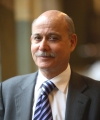Ideologues
Ideologues for an Ecosustainable World
It seems only right to give all those who are collaborating on the creation of a new world fair contribution and recognition. Here are the main authors of that change that we are all working together.
 |
Robert Costanza – (Pittsburgh, September 14, 1950) – It is an American economist. In 1982 he was selected in the Kellogg National Fellow, where he explores and distinguishes itself in the field of environmental conservation. In 1998 Kenneth Boulding Memorial Award receives for outstanding contributions to the emerging green economy. He was director of the Institute for Ecological Economics at the University of Maryland and a professor in the Center for Environmental Science and professor and director of the Institute of Ecological Economics at the University of Vermont. It is co-founder and former president of the International Society for Ecological Economics (ISEE) and is president of the International Society for Ecosystem Health, member of various scientific committees. |
 |
Ivan Illich – (Vienna, 4 September 1926 – Bremen, 2 December 2002) – He was a writer, historian, educator and philosopher Austria. He served as assistant parish in New York. In 1956, he was appointed vice-rector of the Catholic University of Puerto Rico, and in 1961 he founded the Centro Intercultural de Documentación (CIDOC) in Cuernavaca, Mexico, a research center which carried out courses for missionaries in North America. In 1977 he taught at the Faculty of Sociology, University of Trento, where he gave lectures and organized seminars soon became a reference for the student movement. He was appointed a Visiting Professor of Philosophy, Science, Technology and Society at Penn State, and also taught at the University of Bremen. |
 |
Serge Latouche – (Vannes, January 12, 1940) – is a French philosopher and economist. It is one of the leaders of La Revue du Mauss, president of “The ligne d’horizon”, is Professor Emeritus of Economics at the University of Paris XI and the Institut d’Etudes du devoloppement économique et social (IEDES) of Paris. It is among the best-known opponents of Westernization of the planet and a supporter of the decline of localism and friendly. Referring to the thought of Karl Polanyi, he aims to propose the concept of the economy in his work as an activity designed to provide the material means to satisfy the needs of people. Criticizes the notion of development and the notions of rationality and economic efficiency. |
 |
Jeremy Rifkin – (Denver, January 26, 1945). He graduated in economics from the Wharton School of the University of Pennsylvania (Pennsylvania) and International Affairs at the Fletcher School of Law and Diplomacy at Tufts University. Activist of the U.S. peace movement in the sixties and seventies, including support for the adoption of government policies “responsible.” He founded, in 1969, the Citizens Commission for the purpose of making known the war crimes committed by the Americans during the Vietnam War. He is the founder and president of the Foundation on Economic Trends (FOET) and president of the Greenhouse Crisis Foundation. |
 |
Gilbert Rist – (16 July 1938 – 15 February 2023) Was professor emeritus at the Graduate Institute of International and Development Studies in Geneva. He first taught at the University of Tunis, became the Director of the Europe-Third World Centre in Geneva and, later on, Senior Researcher on a United Nations University Project. Afterwards he joined the Graduate Institute of Development Studies where he taught intercultural relations and social anthropology. His main interest is in an anthropological approach of our contemporary society. He is the author of The History of Development. |
 |
Hermann Scheer -(Wehrheim, April 29, 1944 – Berlin, 14 October 2010) was a German politician, former member of the Bundestag in the ranks of the SPD, chairman of Eurostar and the World Council for Renewable Energy. Scheer saw in renewable energy with short supply chains and distribution on the territory of the only alternative to lengthy, complex and polluting production lines and supply of fossil fuels. He received the 1999 Right Livelihood Award for “his tireless work in promoting solar energy in the world.” He disappeared in 2010 at the age of 66 years because of a heart attack. |
 |
Vandana Shiva – (Dehra Dunh, November 5, 1952). Is an Indian activist and environmentalist. In 1993 he received the Right Livelihood Award. In 1978 he graduated in physics at the University of Western Ontario, Canada, with a doctoral thesis on “hidden variables and locality in quantum theory.” In 1982 he founded the Research Foundation for Science, Technology and Natural Resource Policy, a research institute which she directed. It has fought to change paradigms and practices in agriculture and food, was also in charge of intellectual property rights, biodiversity, biotechnology, bioethics, genetic engineering and altro.Nel 1993 he received the Right Livelihood Award. |
 |
Ernst Friedrich “Fritz” Schumacher – (16 August 1911 – 4 September 1977) Was an internationally influential economic thinker, statistician and economist in Britain, serving as Chief Economic Advisor to the UK National Coal Board for two decades. His ideas became popularized in much of the English-speaking world during the 1970s. He is best known for his critique of Western economies and his proposals for human-scale, decentralized and appropriate technologies. According to The Times Literary Supplement, his 1973 book Small Is Beautiful. Schumacher’s basic development theories have been summed up in the catch-phrases Intermediate Size and Intermediate Technology. Together with long-time friends and associates like Professor Mansur Hoda, Schumacher founded the Intermediate Technology Development Group (now Practical Action) in 1966. |
 |
Sachs Wolfgang – (München, November 25, 1946) – Is a German scientist and author of books including: environment and social justice. The limits of globalization. It was also the editor of the dictionary development. He argues that there are three ways to achieve sustainable development, three perspectives that are related to the security crisis: the prospect for the home, the prospect of an astronaut and the endogenous perspective. He currently works and teaches at the Wuppertal Institute in Germany. It is located at the head of a cross-project called “globalization”sustainability”and” the Wuppertal Institute. In 2007 he participated in the Stock Exchange of Visions project. |
 |
Wangari Muta Maathai – (Ihithe, 1 April 1940 – Nairobi, September 25, 2011) – it was an environmentalist, political activist and Kenyan biologist. In 2004 she became the first African woman to receive the Nobel Peace Prize for “her contribution to the cause of sustainable development, democracy and peace”. She was a member of parliament and the Kenyan Assistant Minister for Environment and Natural Resources in the government of President Mwai Kibaki between January 2003 and November 2005. It belonged to ethnic Kikuyu. |
It contains a brief biography of the authors mentioned above, they are only part of the vast world of alternative proposals for a future system. This page will be continually updated. If someone thinks to suggest that authors can write to be entered here: gubissa@tin.it
Guido Bissanti

